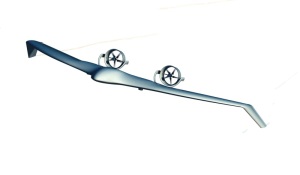por
Thomas Dworetzky, Contributing Reporter | August 10, 2016
Drones are finding their way into every aspect of modern life, but now, thanks to a breakthrough round trip, they offer new hope in the delivery of lifesaving health care to the global poor in the most remote regions, too.
A new project backed by the U.S. Agency for International Development (USAID), is using drones from startup medical drone maker Vayu along with Stony Brook University “to improve health care for vulnerable rural communities where delivery of care is hampered by poor or nonexistent roads,” according to a university statement.
“The flights to and from villages in the Ifanadiana district [of Madagascar] usher in a new era in bringing health care to people living in really remote settings,” said Dr. Peter Small, the Founding Director of Stony Brook’s Global Health Institute. “This would not have been possible without the support of the government and people of Madagascar. In this context drones will find innumerable uses such as accelerating the diagnosis of tuberculosis and ensuring the delivery of vaccines.”



Ad Statistics
Times Displayed: 107569
Times Visited: 6562 MIT labs, experts in Multi-Vendor component level repair of: MRI Coils, RF amplifiers, Gradient Amplifiers Contrast Media Injectors. System repairs, sub-assembly repairs, component level repairs, refurbish/calibrate. info@mitlabsusa.com/+1 (305) 470-8013
The team successfully employed a fully autonomous drone to deliver blood and stool samples from remote villages to the university’s Centre ValBio research station.
That's critical, because on foot the trip would have been as long as 9 hours, and "Blood samples have a shelf life, especially in the tropics," Centre ValBio Executive Director Patricia Wright
told the Associated Press. "This is such an extraordinary thing, to see these people who have been suffering have hope for the future. Some of my best friends have died senselessly. The dying will not happen in the future because these things are preventable with the help of the drones."
What made this possible is the Vayu drone's capability to take off and land like a copter and cover long distances as well. They are roughly the size of a large picnic table, according to the news agency, and have a range of about 40 miles.
“Vayu's accomplishment is as significant for the field of public health in developing countries, where limited access hinders health care, as it is for the future of autonomous unmanned vehicles,” said Vayu’s CEO, Daniel Pepper, a former international journalist and medical student-turned-founder of Vayu.
For example, this groundbreaking demonstration showed that such unmanned autonomous vehicles might soon be used to transport drugs and sensitive samples that would allow physicians to diagnose such health care challenges found in such remote regions. An estimated one billion people live in areas without roads to permit health care to reach them,
according to Bloomberg.

